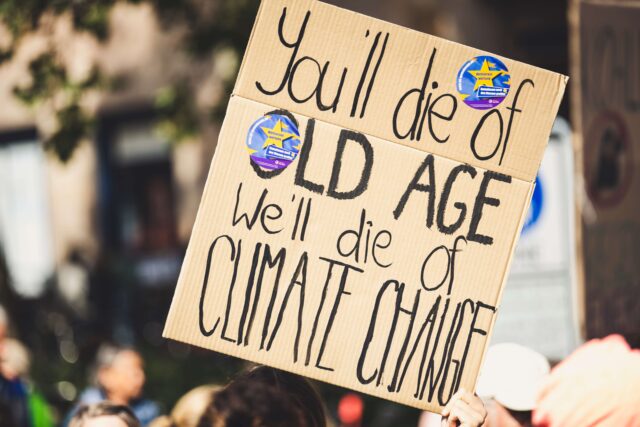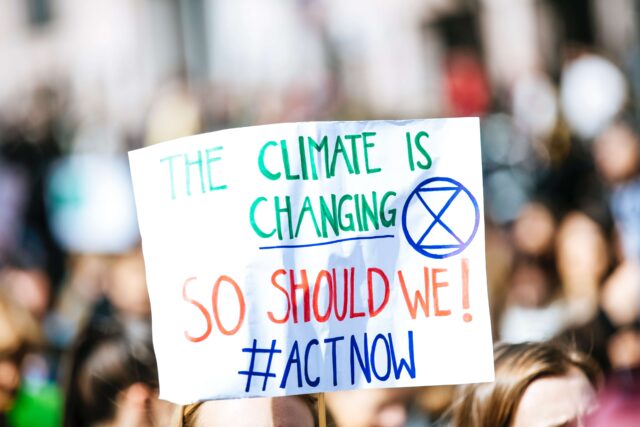Many students still don’t learn about the climate in their degree programs which remains a hurdle to delivering the kind of universal climate requirements that activists like Greta Thunberg demand.
Even many university departments don’t add ‘climate’ to their curriculum owing to a lack of expertise and confidence among teaching staff on the subject as well as the time pressure within already crowded curriculums.

However, as we speak, climate education is expanding rapidly. According to Walter Leal, head of the Climate Change Management department at the Hamburg University of Applied Sciences in Germany, political scientists should look at climate migration and poverty, ethicists at rising inequality and climate change, and economists at the impact of extreme weather events on national economies as they are very closely interconnected.
He says, “It (climate change) is inevitably becoming mainstream, no matter what field, because the connections are so clear now: climate change permeates everything”.
How Climate Change Has Transformed The Academic Fields
The effects of climate change and the extent of the transformation needed to fight against its ill effects have become much clearer in recent years.
Owing to this, law schools, medical schools, literature programs, economics departments, and more are incorporating courses on climate change into their undergraduate curriculums, to prepare the students to face those transformations in the labour market.

In September, the Royal Institute of British Architects (RIBA) published a new Climate Framework, to make climate-literacy components mandatory across its 109 accredited schools and course providers in 23 countries (including 58 of the 61 in the U.K.).
Read more: How Did 18 Y/O Greta Thunberg Become Such A Big World Phenomena So Suddenly?
This renewed understanding of human life being connected and influenced by the environment is reshaping education across the arts and humanities.
Economics students in Buenos Aires are studying the financial cost of environmental degradation. Philosophy students in London are debating individual responsibility and the accumulated debts owed to future generations.
Media studies students in Boston are analyzing climate narratives. Law schools have introduced climate electives for undergraduates, and Bond University in Queensland, Australia, went the extra mile by launching what it believes to be the country’s first undergraduate law degree entirely built around climate law.
For decades, science, design, and technology-based courses which deal directly with the physical environment have included a certain portion of sustainability and the environment. However, they have failed to grasp the effect they have on the climate even though they stand to have a big impact on efforts to lower emissions and adapt to climate change.
Government’s Contribution Towards The Climate Change Movement
According to Peter Mahaffy, a professor of chemistry at King’s University in Edmonton, Alberta, and a member of the education committee at the International Union of Pure and Applied Chemistry (IUPAC), “Earth’s life-support systems are changing at an exponential rate, but education is changing at the rate at which a glacier moves. We teach much the same content that we did 50 years ago,”.

On 27 March 2021, Argentina’s lower house witnessed an overwhelming vote to approve a law for the creation of a national strategy on environmental education “at all levels and in all educational forms”.
In France, the Parliament is debating certain climate laws that aim to modify the education requirements on the environment “throughout school training, in a manner adapted to each level and each specialization,” as per the latest needs. While the higher education institutes will be mandated to incorporate courses that raise awareness and train [students] to deal with the problems of the ecological transition and sustainable development,”.
This came after much pressure from French student unions which found in a March survey that 69% that students have heard very little or nothing about climate issues during their studies if not enrolled or linked to traditional environment courses.
In Spain, lawmakers have amended a climate law to mandate a “cross-cutting” approach to climate education which means all subjects would now incorporate climate from their perspectives rather than having a separate climate-change subject. However, this law is still months away from a final vote.
In Italian high schools, a separate climate-change subject is taught one hour a week on environmental issues in every grade.
Image credits: Unsplash
Sources: TIME Magazine, UNESCO, Earthday.Org
Find the blogger at @sejalsejals38
This post is tagged under: Climate, Climate change, Is Climate change a hoax, Climate variability and change, Natural environment, Ministry of Environment, Forest and Climate Change, Physical impacts of climate change, Pollution, Water Pollution, Air Pollution, Noise Pollution, How is COVID-19 and pollution interconnected, Atmosphere of Earth, Earth day, Climate Change Performance Index, Greenhouse gases, Carbon emission, Sustainability, World Environment Day, Weather and climate, Fossil fuel burning, Seapiracy, climate change in India, What is Climate change, the impact of climate change, global warming, climate change causes, the effect of climate change, global warming and climate change, the impact of climate change on agriculture, reducing the effects of climate change, The Royal Institute of British Architects, International Union of Pure and Applied Chemistry (IUPAC, Bond University in Queensland, Australia, How’s Climate change reshaping college education, Why should climate change must be introduced as a course in college, Why should climate change must be introduced as a course in University, Why there’s a lack of academic courses on climate change, Greta Thunberg, Climate activist
Other recommendations:
Google Earth’s New Time-Lapse Feature Shows Impact Of 37 Years Of Climate Change






























